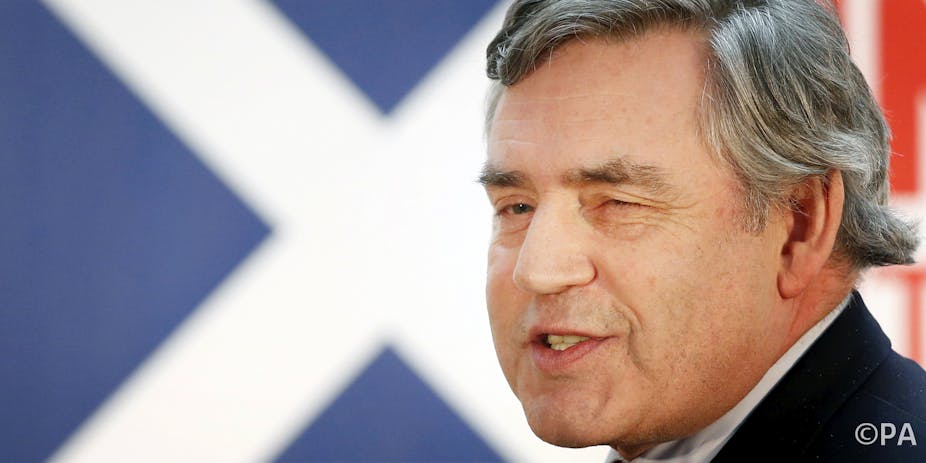After long being absent, Gordon Brown has suddenly been all over the referendum campaign. He has criticised the no campaign for being too negative and called for David Cameron to agree to a television debate with Alex Salmond.
He also dubbed the Treasury’s Lego-figure guide to how Scots could spend what they save after a no vote “patronising”. We asked our panel what he was up to.
John Curtice, Professor of Politics, University of Strathclyde/ScotCen Social Research
No one else in Better Together has said it would be a good idea for David Cameron to debate with Alex Salmond. Most people think it probably is not in Better Together’s interests, not least because, as Cameron himself has said, having an English Tory coming north to debate with Salmond is not the best way of promoting the no cause. And if Salmond refuses to debate with anybody else, does the no side care? If, as a result, the yes side end up not using Salmond in any debate, I would suspect the Better Together team would be delighted.
Whatever Cameron decides to do, Brown has put himself in a position where journalists could now suggest that Brown himself should offer to debate with Salmond. It would be difficult for him to say no, given that he has just criticised Cameron for refusing to do so. And it would be slightly more awkward for Salmond to turn down such an offer than the chance to debate with Alistair Darling.
Brown’s remark was perhaps also an illustration of one of the problems the no side faces: its people are also thinking about the 2015 election. It is no secret that Brown is not Cameron’s greatest fan. I would not be surprised if Brown was trying to convey the message that, “David Cameron is feart; if I were in his job, I would have done it, and therefore he is not the right man to be prime minister after 2015.”
But beware assuming a response to a journalist’s question represents a deliberate intervention. Just as Barack Obama was responding to a question in his remarks about the referendum last week, the same was true of Brown’s remarks about Cameron. Both may have said more than they originally intended.

Still, there is no doubt that Brown has not always seen eye-to-eye with Alistair Darling. Of his broader criticism of Better Together, there is perhaps a little bit of Brown saying, “Alistair is messing this up, I am willing to come across from Fife to help ensure that we fight a positive campaign.”
Brown’s argument in favour of the union has focused on something we have found in the Scottish Social Attitudes Survey, which is that the idea of pensions and welfare being funded UK-wide is one of the few things other than the economic consequences of independence that apparently affects people’s voting intentions. Those who would prefer welfare to be funded UK-wide are more likely to say they will vote no even after taking into account their views about the economy.
Darling’s favourite anti-independence argument is his claim that monetary union with England would create untold difficulties. Brown’s big subject is the importance of maintaining a welfare state that provides people with a safety net, an objective he believes can be more securely delivered within the UK. The research says that of the two arguments, the one about welfare funding has the greater traction in persuading voters to support no.
Trevor Salmon, Emeritus Professor of Politics and International Relations, University of Aberdeen
Given the number of Tory seats, and leaving aside the fact that he’s a toff, why would a Conservative prime minister agree to take part in a debate? Also, Alex Salmond knows Scotland. It would be like a tennis match in which he’s been preparing for 40 years and David Cameron would have been preparing for ten minutes.
And everybody knows that in a debate with Alex Salmond, Salmond wins. He has the ability to turn an argument. I just don’t understand why Gordon Brown said that. It can only hurt Better Together.
To some extent Better Together negativity is inevitable, since they obviously believe that what will happen will be negative if Scotland votes yes. But the three parties should have got together earlier and agreed an offer for the Scots. And they could have said much more along the lines of, you are going to give David Cameron another 10 years of power in England if you vote yes. So to some extent I agree with Gordon Brown’s criticism here.
But his influence is limited. Fundamentally more people trust Alistair Darling than Brown. When Darling was chancellor, he probably told the truth about what was happening to the economy. And he wanted to say more before the election in 2010, but Brown overruled him.
More generally, where have you been Gordon? You wonder why now. It’s too late. Other people have been doing the work. Saying that, you have to question whether Better Together would have wanted him earlier. You can’t control him. But on the whole, his interventions won’t hurt the campaign. It’s an irritant rather than anything fatal.
There are two things that may be pulling the campaign in opposite directions. First, the yesses are more likely to go and vote. On the other hand, no voters perhaps don’t like publicly saying how they will vote – in keeping with when people didn’t tell pollsters they would vote for John Major in 1992.
I think the turn-out will determine what will happen. If it’s lower, the yesses will win. These are people that will go out and vote even if it’s snowing. If the turnout is higher, say about 65%, the no’s will win.
In the European elections, Alex didn’t do as well as people expected, which was interesting. As we’ve passed the 100-day mark, I think the result is going to be a no just in no more.
For previous panel discussions, click here.

